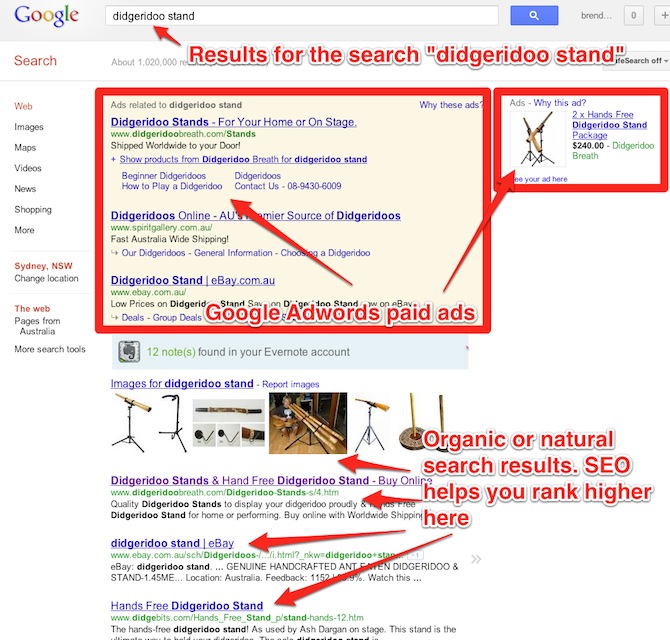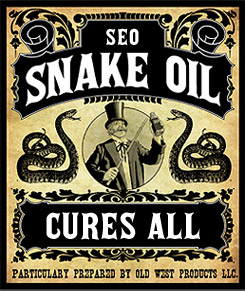
Search Engine Optimisation, or SEO, involves affecting the visibility of a website or page in search engine results. When you’re searching on Google the top few results demonstrate “good SEO”; these websites and pages are well optimised so they rank first. Ranking first, or at least in the top 3, can significantly boost a business’ leads, revenue and customer base. Search activity is ubiquitous. Searches represent interested, targeted prospects who are often ready to book, buy or subscribe. SEO is reportedly a billion dollar industry. A billion dollar industry headed for an enormous upheaval.

Google’s forthcoming update, dubbed ‘Penguin 2.0’, will affect search results across most industries globally. It will potentially impact search results for your business. And it will abruptly destroy a long-running snake oil SEO industry. According to Google this dramatic change is a “few months” away.
Listen up. When Google throws the switch search results will dramatically change. Leads and revenue will be re-distributed. For some businesses, this will be like having your product range removed from the shelf at the supermarket and thrown out the back. They’ll no longer be visible to passing traffic. Listen to Matt Cutts, head of Google’s Webspam team, talking about the changes or read on to learn why this change is happening and what it means for you.
Broadly speaking, there are two parts to SEO - onsite SEO and offsite SEO. For the sake of simplicity let’s just say onsite SEO is mainly concerned with the quality of your website structure and content. If your website is well designed, well built and well written for your target audience you’re probably doing a decent job of onsite SEO. Particularly if you regularly publish useful content like blog posts. Offsite SEO can be shrouded in mystery; a black art that involves link building and other tactics.
Agencies and internet marketers who build links for offsite SEO may be using link schemes, which have long been a violation of Google’s guidelines. In Google’s words, here’s a suggestion of what ‘link scheme’ means:
Any links intended to manipulate a site’s ranking in Google search results may be considered part of a link scheme.
If you’re buying links, or links are being bought on your behalf, and your site is benefiting from those links, you’re in violation of Google’s guidelines. Put it this way - if you’re paying for links, and you’re being flowed what Google calls PageRank, you’re breaking the rules. It’s been against the rules for years and it’s been going on for longer. It’s about to be strictly penalised. If you’re buying links, it’s time to seriously re-think your SEO strategy before Google imposes these penalties:
We do take this issue very seriously, so we recommend you avoid selling (and buying) links that pass PageRank in order to prevent loss of trust, lower PageRank, lower rankings, or in an extreme case, removal from Google’s search results.
Yeah, you read that right. Removal from Google’s search results. Link schemes have always been against the rules, but link scheme detection and penalties are getting serious. Google’s ‘Penguin’ update in April 2012 made the first move to start penalising link schemes. While it only affected a small percentage of the Internet, ‘Penguin’ and subsequent minor updates gave a strong warning. ‘Penguin 2.0’ is Google’s next major update, and according to Google’s Matt Cutts, it’s cracking down on people paying to manipulate search results.
The days of snake oil SEO are over. If you’re currently paying for SEO, I recommend asking your agency or internet marketer what the offsite SEO strategy has been. You might like to ask: “Can you show me a chart and list of all of my backlinks and linking domains?” (A ‘linking domain’ is the top-level website address for websites linking to you - it’s a good summary). If you engaged them in February 2013 your backlink chart might look something like this. Dramatic spikes are usually bought links:

The above chart is a typical link scheme pattern. Hundreds of links are bought initially, then bursts of link buying - usually in the hundreds - continue to enhance a site’s profile over time. Once a site is performing well in search results, the link buying usually tapers off into a low volume maintenance pattern to “keep the site up there”. Agencies, internet marketers and businesses partial to snake oil have been doing this for years. It’s quick, easy, cheap and until now it’s “worked” to an extent. It’s also been publicised by Google as being against the rules.

Until now you probably haven’t cared where your links are coming from. Hint: if you’ve been buying them, your backlinks are likely to be coming from places including Russia, India, Poland or China. The mysterious black art is being executed by guys like this, jammed into rooms filled with other guys like this ↑
It’s time to start caring. There’s traffic and revenue on the line. If link schemes have been the offsite SEO strategy you need to know the size of the damage and start counteracting it. You can work with your agency (or a new one) to prepare for the change and minimise the fallout.
This is a big deal. If you’ve done any sort of offsite SEO activity you need to check the state of your backlinks. High quality directories are within the rules - even if they’re paid. High quality, relevant links are within the rules. Low-quality, bulk link buying is against the rules and people doing it are about to be exposed.
So, what’s my take on all of this? Should Google be penalising people for cheating the system? Of course they should, I’m stoked this change is coming. It’s overdue. Search results shouldn’t be determined by who’s buying the most links and outspending the competition. Google should reward the best websites and results determined by their relevance and usefulness. The snake oil era is over. The Internet will be a better place for it.
Similarly, I applaud YouTube (owned by Google) for stripping Universal and Sony of 2 billion fake YouTube views. I’ll be relieved when Twitter finally penalises people and brands for buying fake Twitter followers. This can’t be far off. Ever wondered how an account has so many followers? Chart it with Twitter Counter and look for spikes and big increases. Spike = buying followers, which is no more ethical than buying links. (The only other explanation for a spike is promoted tweets, which due to cost is mostly the domain of big brands).
Man, enough with deception already. Let’s turn off the smoke, smash the mirrors, and execute genuine digital marketing founded in the power of ideas and utility of brands. I admire Google for taking action. Penalising cheats is true to their “do no evil” mantra. Google is trying to make the Internet a better place.
Back to SEO. Our fundamental approach to SEO for our clients is as per Google’s best practices. Our clients will be affected by this change - they’ll be further rewarded for their high quality websites and might see a few competitors fall away. We employ sustainable SEO entirely within the rules. All digital marketing and customer acquisition at the Village is ethical, sustainable and strategic. The way it should be. And it works.
If your business has been unknowingly participating in link schemes, that sucks. I hope this is a useful heads up. All the best for the Penguin 2.0 update, it’s about to get real. Good luck.




